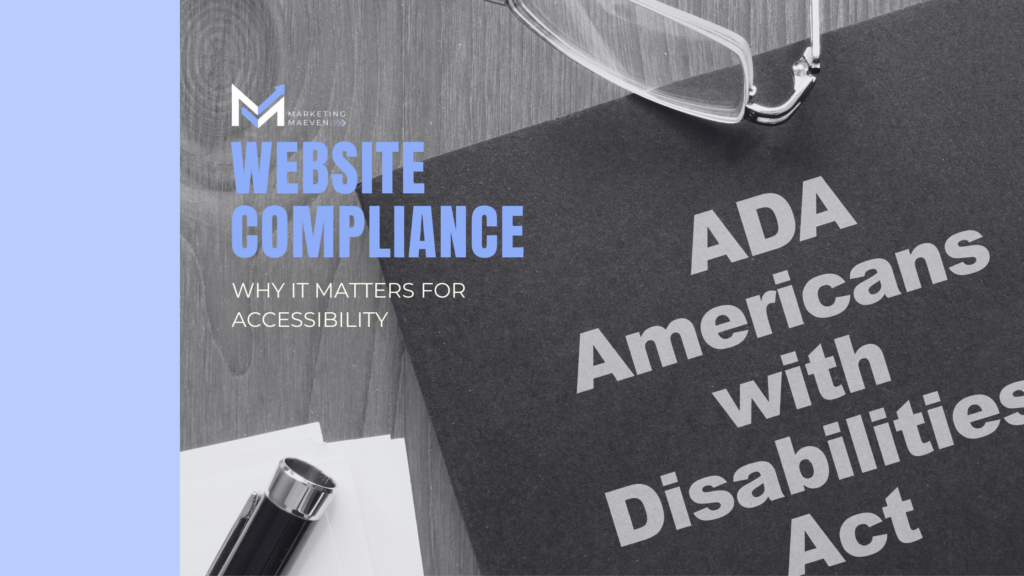In today’s digital-first world, your website isn’t just a storefront—it’s often the first interaction customers have with your business. But here’s the thing: if your website isn’t accessible to everyone, you might be unintentionally shutting the door on a significant portion of potential clients. Accessibility isn’t just about doing the right thing—it’s also a legal requirement under the Americans with Disabilities Act (ADA).
Let’s break down why website compliance matters for accessibility, what’s at stake, and how a few simple changes can make your site more inclusive.
The Ins and Outs of Website Compliance
What is Website Accessibility?
Website accessibility ensures that everyone, including people with disabilities, can navigate and interact with your site. Disabilities can range from visual and hearing impairments to cognitive and motor challenges.
Think about it—if someone using a screen reader can’t access your service descriptions, or if your navigation isn’t keyboard-friendly, they may not be able to use your site at all. That’s not just inconvenient; it’s exclusionary.
The Legal Landscape: ADA and Website Compliance
The Americans with Disabilities Act (ADA), signed into law in 1990, prohibits discrimination against individuals with disabilities in all areas of public life. Over time, its scope has extended to websites. Courts increasingly recognize websites as places of public accommodation, meaning they need to be accessible to everyone.
Failing to meet ADA guidelines could leave your business open to lawsuits, fines, and reputational damage. But it’s not just about avoiding penalties—it’s about making your services available to a broader audience and showing that your brand cares about inclusivity.
Why Accessibility is Good for Business
- Expanded Audience: Over 61 million Americans live with a disability. Accessible websites invite more people to engage with your business.
- Improved SEO: Many accessibility improvements—like descriptive alt text—also benefit your site’s search engine optimization (SEO).
- Enhanced User Experience: Accessibility features often improve usability for everyone, including people using mobile devices or experiencing slow internet connections.
Quick Wins for Website Accessibility
You don’t need a full site overhaul to get started with accessibility. Here are a few simple updates you can make today:
- Use Clear, Readable Fonts and Colors
Choose fonts that are easy to read, like sans-serif styles, and ensure good contrast between text and background colors. For example, light gray text on a white background might look modern, but it’s tough for many to read. - Add Descriptive Alt Text to Images
Alt text describes the content of images for screen readers. For example, instead of naming an image “IMG_1234.jpg,” describe it as “A smiling plumber fixing a kitchen sink.” This helps visually impaired users understand your visuals. - Ensure Keyboard-Friendly Navigation
Some users can’t navigate with a mouse and rely on keyboards instead. Make sure your site allows visitors to tab through menus, links, and forms seamlessly. - Offer Captions for Videos
Add captions to all videos to make them accessible to people with hearing impairments. Tools like YouTube’s auto-captioning feature can help you get started. - Simplify Forms
Create forms that are easy to fill out with clear labels, instructions, and error messages.
Your Next Step: Get a Free Accessibility Scan
Creating an accessible website doesn’t have to be overwhelming, and you don’t have to do it alone. At Marketing Maeven, we specialize in making websites compliant, inclusive, and user-friendly.
Ready to see where your site stands? Request a free website accessibility scan today. We’ll identify simple changes to help you align with ADA guidelines, expand your audience, and create a better experience for all users.
Accessibility isn’t just a legal obligation—it’s an opportunity to connect with more people and show that your business is built on inclusivity. Let’s make your site a place where everyone feels welcome.
Making your website accessible doesn’t just protect your business; it builds trust and loyalty among your audience. After all, inclusivity is good for everyone.

